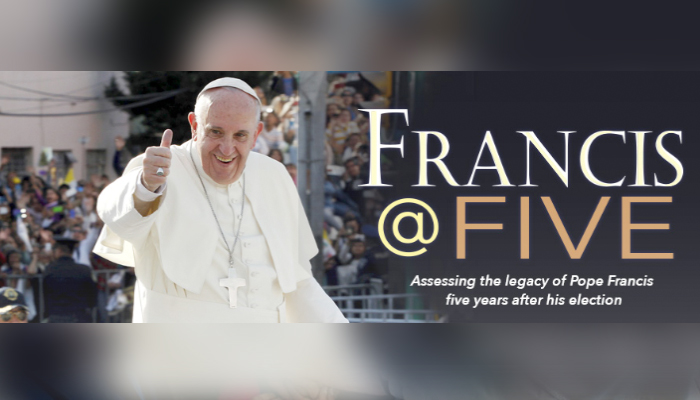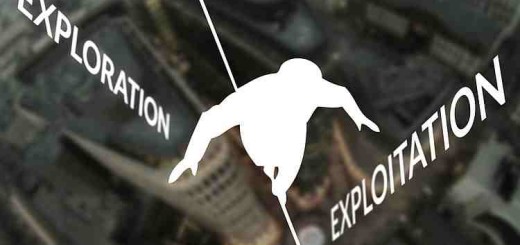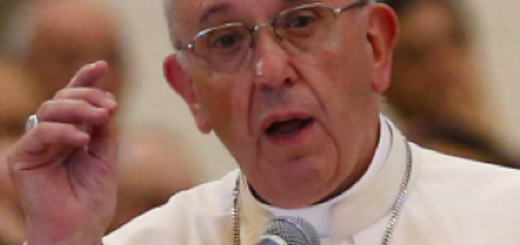Rating Pope Francis’ Reign – dr. James Kottoor

He completes five years as Pope on Mar.13, 2018
Printed media around the world are making an assessment of Pope Francis going to complete five years of his rule on March 13th Three years ago he had said: “I have the sense that my pontificate will be brief: four or five years.”
It is in this context, that the article in the Jesuit weekly, given below becomes all too relevant. This article is making an assessment of his performance. It highlights the lights and shadows of his pontificate.
Everlasting Man (Jesus of Nazareth) always in the company of the CATTLE CLASS!
Friend of the poor
What shines bright is, the Pope’s humble, simple life style imitating his heavenly patron St.Francis Assisi and his total dedication to defend the cause of the poor, the marginalized and downtrodden. What is under the shadow in various stages – gray, cloudy and dark – are his efforts to reform the Church, especially in areas of financial and sexual corruption.
The peak point of darkness he has reached is his latest handling of cover ups of pedophilia (sexual abuse of children by priests) of Bishop Barros of Chile, which he first termed downright ‘calumny’ or ‘slander’ by vested interest groups.
In the face of blunt objections from victims of abuse and criticism by media, the silver lining that emerged is that he showed his graciousness to order a fresh investigation to be conducted by the most reputed person in the Vatican, which is still going on.
He is thus proclaiming to the whole world that none of the “His Excellencies, His Lordships or His Eminences”, not even ‘His Holiness’ the Pope at the very top of the Church’s pyramidal Hierarchy has any hot-line to heaven; that all are equally fallible and therefore, all have to change, some time or other even their heart-felt convictions, because it is mark of a wise man to change one’s views in the light of better light.(Mutare concilium est sapietis)
31 % positive vs 30% negative
Therefore while 30 percent of the Jesuit Review’s readers rate him as “somewhat negative.” 31 % say he is “somewhat positive.” For good or ill, a single sound bite sometimes sums up the essence of an entire papacy. If one goes by that rule, Pope Francis may go down in history as the “Who am I to judge? Pope” and equally as the preacher and promoter of the “name of my God is MERCy Pope”, since he presents God as the Father of the Prodigal Sons and daughters that we all are and therefore too quick to forget and forgive and too slow to Judge and punish. Why?
Because in a sermon he had said: that being merciful includes seeking forgiveness for one’s own sins, rather than condemning the shortcomings of others. “Who am I to judge this? Who am I to gossip about this? Who I am, who have done the same things, or worse?”
May He live 100 years
CCV wishes him “Centum Annos”, a hundred years, at least two other Five Year terms, since he has too many items in his Reform Programme to be completed. Most important is to put a moratorium on Church buildings (the Son of Man didn’t have a place to rest his head) and start building the People of God, starting from the CATTLE CLASS and going beyond all divisive churches and organized religions, to embrace the whole of humanity including the Atheists. That alone is ‘Catholicity’ pure, unadulterated and convincing.
Rebuilding humane humanity
Building a Humane Humanity after the model of the SON OF MAN who befriended the gentiles, the Samaritans, the outcasts, those on the margins of society and the so-called ‘sinners’ is the need of the hour, because Jesus the Jew, called also the Nazareen and “Eternal Galelean” (Fulten J. Sheen) and “Ever lasting Man”(Chesterton) came to serve and save the so-called ‘sinners’, not the saints, and to heal the sick, not the healthy. james kottoor, editor, ccv.
Please read below the article in Jesuit Weekly
Five years into Pope Francis’papacy, there is much more noise tobe made!
The Editors, in America Jesuit weely,February 23, 2018
Pope Francis greets the crowd as he visits the Divine Mercy Shrine in Lagiewniki, a suburb of Krakow, Poland, July 30. (CNS photo/ L'Osservatore Romano, handout).
Three years ago this March, Pope Francis made a startling observation during an interview with the Mexican media company Televisa: “I have the sense that my pontificate will be brief: four or five years.”
Since two years had already passed since his election on March 13, 2013, Francis’ offhand remark seemed to put an unexpectedly short timeline on his papacy.
We now mark five years of Francis’ pontificate. The editors of America wish him many more. “Hagan lio,” he told a crowd of millions at World Youth Day in Rio de Janeiro in 2013, “Make some noise,” and there is no question that this pontificate has done just that.
Jorge Bergoglio’s own experiences in Jesuit ministries and as archbishop of Buenos Aires clearly molded him to be an outspoken pope of the poor, the marginalized and the victims of a throwaway culture.
He has bluntly rejected the wealth and trappings of his office, and the simple gestures that have accompanied this conviction will be the enduring symbols of his pontificate. Francis has intensified his predecessor Benedict XVI’s strong condemnations of war, an unfettered market and growing economic disparity; he has also offered a blunt but welcome prophetic voice of correction to international leaders, including President Trump.
In five years, Francis has produced three landmark documents. First came his apostolic exhortation “The Joy of the Gospel” (“Evangelii Gaudium,” 2013), in which he sketched out his vision of a church whose strengths and resources should “be suitably channeled for the evangelization of today’s world rather than for her self-preservation” (No. 27).
It was followed soon after by “Laudato Si’.” While widely received as a call for environmental protections and a critique of consumerism, the encyclical is also one of the most important social justice encyclicals in history. “Everything is related,” Pope Francis wrote. We cannot affirm the rights of humanity while denying the dignity of our environmental home; we cannot abort or euthanize or marginalize unwanted humans as if they were trash; and we cannot trash the planet in the pursuit of wealth or ease or misbegotten notions of freedom.
More controversial was Francis’ post-synodal exhortation on the family, “The Joy of Love” (“Amoris Laetitia,” 2016). That exhortation, which looked at a broad range of topics related to human love, also opened up the possibility for those who are divorced and remarried to return to the sacraments under certain conditions. That pastoral concession has drawn the loudest cries: affirmations from many living and ministering in difficult pastoral situations and vigorous criticism from those who charge that the pope is contradicting the doctrine of the church.
A quieter but more dramatic shift is the new emphasis in “Amoris Laetitia” on the authority of the local bishop in the pastoral application of universal church law. Critics of this devolution of authority say that it will result in the church teaching in one town what is not taught in another, which is contrary to the universality of the church. But this criticism confuses universality with uniformity, an error against which Francis has been outspoken. Respect for the authority of local structures in the church will help us to regain a sense of the ecclesiology of communion while also respecting cultural differences.
Such hopeful lights make the shadows of this pontificate all the more disappointing. None has been more painful than Francis’ uneven response to sexual abuse in the church, precisely because those who have been abused by clergy are some of the most obvious victims of the throwaway culture Francis condemns. The pope recently appointed new members to the Pontifical Commission for the Protection of Minors he created in 2014, including lay representatives, hopefully giving the commission new life after repeated complaints from previous members that some Vatican officials were refusing to cooperate with the commission.
Worse is the ongoing crisis of the church in Chile, where Francis defended a bishop accused of failing to report sexual abuse despite substantial evidence of wrongdoing, going so far as to accuse the bishop’s accusers of slander. While Francis has since apologized for his insensitivity and dispatched a high-ranking official to investigate the claims, the damage to already wounded hearts and to the pope’s credibility was great.
Vatican reform has also foundered despite Francis’ appointment in 2013 of a council of cardinals tasked with overhauling the Vatican Curia. Little public progress has been made to cure the Vatican’s sclerotic culture, and much in the Vatican’s operations remains as opaque as ever. Ecclesia semper reformanda est. A church newly open to mission must be a church that listens to voices it has ignored in the past to its great detriment, first and foremost those of women.
On the level of diplomacy and ecclesiology, recent weeks have brought new signs of hope for the Catholic Church in China. Francis has continued the delicate and frustrating work of engagement with the Chinese government to normalize the church’s life in that nation. Controversial but pragmatic moves toward a policy of jointly appointing bishops with the government have raised the possibility of reaching a long-desired goal: a united Catholic Church in China for the first time in 70 years. Matteo Ricci, S.J. would be proud.
This litany of lights and shadows speaks to a larger matter: the personal goal that Francis seems to have set for his papacy. His critics are certainly right about one thing: He does indeed seek “to change the church,” not in its essentials, but in its orientation to the contemporary world. The church is “not a catalog of prohibitions” to be enforced, Pope Benedict XVI reminded us, nor is it an elite club for the saved. We must not forget that the church is her mission. As Pope Francis said before the conclave in which he was elected, the church must go out of itself to proclaim fully the invitation to join in Christ’s mission of salvation and redemption. Five years into this groundbreaking papacy, there is much more noise to be made.(This article also appeared in print, under the headline "In Praise of Noise," in the March 5, 2018 issue.)
Readers’ rating of Francis
To the question: "How do you rate Pope Francis’ handling of sex abuse in the church?," readers answered the following:
Thirty-one percent of readers rated Pope Francis’ handling of sex abuse in the church as “somewhat positive,” while 30 percent of readers told us it was “somewhat negative.”…. Chris Carroll of Philadelphia alluded to Pope Francis’ defense of Bishop Juan Barros, who has been accused of being present during instances of sex abuse by the notorious Chilean predator, the Rev. Fernando Karadima. “The pope has not gone as far as I would like,” said Mr. Carroll. “The church is still protecting some clergy.”….. “his insistence on Bishop Barros’s innocence, shows a distinct lack of understanding of sex abuse,” said Ms. Balan-DiBella.
For good or ill, a single sound bite sometimes sums up the essence of an entire papacy. Those sound bites help us understand the priorities and personalities of the popes, and while it’s perhaps too early to speculate which sound bite will ultimately define Pope Francis, it’s hard to imagine anything coming close to a question he asked in 2013: “Who am I to judge?” “If a person is gay and seeks the Lord and has good will, well who am I to judge them?” the pope had asked.
It was a simple question that nonetheless would go on to define the papacy of a pastor whom the world was just getting to know. It also signaled an openness from the highest echelons of the church toward accompanying gays and lesbians on their faith journeys, something relatively novel in recent church history.
Another of his famous lines were that he prefers a church that is “bruised, hurting and dirty because it has been out on the streets, rather than a church which is unhealthy from being confined and from clinging to its own security.” He added saying, that it makes Christians fixate on “rules which make us harsh judges.”
But the question he asks points to a Christian virtue much more important to Francis—mercy. To put it succinctly, Pope Francis believes that the world has forgotten what it means to be merciful and that being overly judgmental prevents us from showing mercy to others.
He also said in a sermon, reported in Osservatore Romano: that being merciful includes seeking forgiveness for one’s own sins—rather than condemning the shortcomings of others. “Who am I to judge this? Who am I to gossip about this? Who I am, who have done the same things, or worse?” he asked.
















